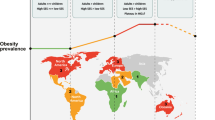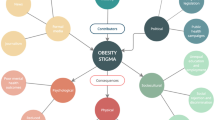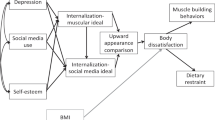Abstract
Background
Diet, physical activity, and psychosocial factors are independent and potentially interactive obesity determinants, but few studies have explored complex behavior patterns.
Purpose
The purpose of this study is to examine obesity-related behavior patterning and identify high-risk adolescent groups.
Methods
Cluster analysis identified groups with shared behavior patterns in the National Longitudinal Study of Adolescent Health (1995 and 1996, ages 11–21; N = 9,251). Descriptive and multivariate regression analyses compared sociodemographics and prevalent and incident obesity across clusters.
Results
Seven and six clusters in males and females, respectively, represented behavior patterns such as School Clubs & Sports, Sedentary Behaviors, Dieters, and Junk Food & Low Activity. Sociodemographics varied across clusters. Compared to School Clubs & Sports clusters, adjusted odds of prevalent and incident obesity were higher for most clusters in females but not males.
Conclusions
Cluster analysis identified several obesogenic behavior patterns, highlighting areas for future research and potential avenues for interventions that target broad lifestyle factors.


Similar content being viewed by others
References
Ogden CL, Carroll MD, Curtin LR, et al. Prevalence of overweight and obesity in the United States, 1999–2004. JAMA. 2006; 295: 1549–1555.
Wang Y, Monteiro C, Popkin BM. Trends of obesity and underweight in older children and adolescents in the United States, Brazil, China, and Russia. Am J Clin Nutr. 2002; 75: 971–977.
Popkin BM, Gordon-Larsen P. The nutrition transition: worldwide obesity dynamics and their determinants. Int J Obes Relat Metab Disord. 2004; 28(Suppl 3): S2–S9.
Hancox RJ, Milne BJ, Poulton R. Association between child and adolescent television viewing and adult health: a longitudinal birth cohort study. Lancet. 2004; 364: 257–262.
Must A, Tybor DJ. Physical activity and sedentary behavior: a review of longitudinal studies of weight and adiposity in youth. Int J Obes (Lond). 2005; 29(Suppl 2): S84–S96.
Ludwig DS, Peterson KE, Gortmaker SL. Relation between consumption of sugar-sweetened drinks and childhood obesity: a prospective, observational analysis. Lancet. 2001; 357: 505–508.
Berkey CS, Rockett HR, Field AE, Gillman MW, Colditz GA. Sugar-added beverages and adolescent weight change. Obes Res. 2004; 12: 778–788.
Giammattei J, Blix G, Marshak HH, Wollitzer AO, Pettitt DJ. Television watching and soft drink consumption: associations with obesity in 11- to 13-year-old schoolchildren. Arch Pediatr Adolesc Med. 2003; 157: 882–886.
Popkin BM, Udry JR. Adolescent obesity increases significantly in second and third generation U.S. immigrants: the National Longitudinal Study of Adolescent Health. J Nutr. 1998; 128: 701–706.
Kimm SY, Glynn NW, Obarzanek E, et al. Relation between the changes in physical activity and body-mass index during adolescence: a multicentre longitudinal study. Lancet. 2005; 366: 301–307.
Janssen I, Katzmarzyk PT, Boyce WF, et al. Comparison of overweight and obesity prevalence in school-aged youth from 34 countries and their relationships with physical activity and dietary patterns. Obes Rev. 2005; 6: 123–132.
Gordon-Larsen P, Adair LS, Popkin BM. Ethnic differences in physical activity and inactivity patterns and overweight status. Obes Res. 2002; 10: 141–149.
Barton BA, Eldridge AL, Thompson D, et al. The relationship of breakfast and cereal consumption to nutrient intake and body mass index: The National Heart, Lung, and Blood Institute Growth and Health Study. J Am Diet Assoc. 2005; 105: 1383–1389.
Dietz WH, Gortmaker SL. Preventing obesity in children and adolescents. Annu Rev Public Health. 2001; 22: 337–353.
Loktionov A. Common gene polymorphisms and nutrition: emerging links with pathogenesis of multifactorial chronic diseases (review). J Nutr Biochem. 2003; 14: 426–451.
Epstein LH, Roemmich JN, Paluch RA, Raynor HA. Influence of changes in sedentary behavior on energy and macronutrient intake in youth. Am J Clin Nutr. 2005; 81: 361–366.
Nelson MC, Gordon-Larsen P, Adair LS, Popkin BM. Adolescent physical activity and sedentary behavior patterning and long-term maintenance. Am J Prev Med. 2005; 28: 259–266.
Owen N, Leslie E, Salmon J, Fotheringham MJ. Environmental determinants of physical activity and sedentary behavior. Exerc Sport Sci Rev. 2000; 28: 153–158.
Sanchez A, Norman GJ, Sallis JF, et al. Patterns and correlates of physical activity and nutrition behaviors in adolescents. Am J Prev Med. 2007; 32: 124–130.
Burke V, Milligan RA, Beilin LJ, et al. Clustering of health-related behaviors among 18-year-old Australians. Prev Med. 1997; 26: 724–733.
Monda KL, Popkin BM. Cluster analysis methods help to clarify the activity-BMI relationship of Chinese youth. Obes Res. 2005; 13: 1042–1051.
Aldenderfer M, Blashfield RK. Cluster Analysis. Newbury Park: Sage; 1984.
Sharma M. School-based interventions for childhood and adolescent obesity. Obes Rev. 2006; 7: 261–269.
Jurg ME, Kremers SP, Candel MJ, Van der Wal MF, De Meij JS. A controlled trial of a school-based environmental intervention to improve physical activity in Dutch children: JUMP-in, kids in motion. Health Promot Int. 2006; 21: 320–330.
Gortmaker SL, Peterson K, Wiecha J, et al. Reducing obesity via a school-based interdisciplinary intervention among youth: planet health. Arch Pediatr Adolesc Med. 1999; 153: 409–418.
Steckler A, Ethelbah B, Martin CJ, et al. Pathways process evaluation results: a school-based prevention trial to promote healthful diet and physical activity in American Indian third, fourth, and fifth grade students. Prev Med. 2003; 37: S80–S90.
Robinson TN, Killen JD, Kraemer HC, et al. Dance and reducing television viewing to prevent weight gain in African–American girls: the Stanford GEMS pilot study. Ethn Dis. 2003; 13: S65–S77.
Allender S, Cowburn G, Foster C. Understanding participation in sport and physical activity among children and adults: a review of qualitative studies. Health Educ Res. 2006; 21: 826–835.
Kuo J, Voorhees CC, Haythornthwaite JA, Young DR. Associations between family support, family intimacy, and neighborhood violence and physical activity in urban adolescent girls. Am J Public Health. 2007; 97: 101–103.
Gordon-Larsen P, McMurray RG, Popkin BM. Adolescent physical activity and inactivity vary by ethnicity: the National Longitudinal Study of Adolescent Health. J Pediatr. 1999; 135: 301–306.
Newby PK, Muller D, Tucker KL. Associations of empirically derived eating patterns with plasma lipid biomarkers: a comparison of factor and cluster analysis methods. Am J Clin Nutr. 2004; 80: 759–767.
Millen BE, Quatromoni PA, Pencina M, et al. Unique dietary patterns and chronic disease risk profiles of adult men: the Framingham nutrition studies. J Am Diet Assoc. 2005; 105: 1723–1734.
Newby PK, Tucker KL. Empirically derived eating patterns using factor or cluster analysis: a review. Nutr Rev. 2004; 62: 177–203.
U.S. Department of Health and Human Services, U.S. Department of Agriculture. Dietary Guidelines for Americans. In Dietary Guidelines for Americans. 6th ed. City; 2005.
Popkin BM, Armstrong LE, Bray GM, et al. A new proposed guidance system for beverage consumption in the United States. Am J Clin Nutr. 2006; 83: 529–542.
Sallis J, McKenzie T, Kolody B, et al. Effects of health-related physical education on academic achievement: Project SPARK. Res Q Exerc Sport. 1999; 70: 127–134.
Dietz WH. The role of lifestyle in health: the epidemiology and consequences of inactivity. Proc Nutr Soc. 1996; 55: 829–840.
StataCorp. Multivariate Statistics Reference Manual, Stata Statistical Software, Release 9. College Station, TX: StataCorp; 2005.
Hammer J, Howell S, Bytzer P, Horowitz M, Talley NJ. Symptom clustering in subjects with and without diabetes mellitus: a population-based study of 15,000 Australian adults. Am J Gastroenterol. 2003; 98: 391–398.
Duffey KJ, Popkin BM. Adults with healthier dietary patterns have healthier beverage patterns. J Nutr. 2006; 136: 2901–2907.
Must A, Anderson SE. Body mass index in children and adolescents: considerations for population-based applications. Int J Obes (Lond). 2006; 30: 590–594.
Glymour MM, Weuve J, Berkman LF, Kawachi I, Robins JM. When is baseline adjustment useful in analyses of change? An example with education and cognitive change. Am J Epidemiol. 2005; 162: 267–278.
Pederson S, Seidman E. Team sports achievement and self-esteem development among urban adolescent girls. Psychol Women Q. 2004; 28: 412–422.
van Mechelen W, Twisk JW, Post GB, Snel J, Kemper HC. Physical activity of young people: The Amsterdam Longitudinal Growth and Health Study. Med Sci Sports Exerc. 2000; 32: 1610–1616.
Adams J. Trends in physical activity and inactivity amongst US 14–18 year olds by gender, school grade and race, 1993–2003: Evidence from the youth risk behavior survey. BMC Public Health. 2006; 6: 57.
Aaron DJ, Storti KL, Robertson RJ, Kriska AM, LaPorte RE. Longitudinal study of the number and choice of leisure time physical activities from mid to late adolescence: implications for school curricula and community recreation programs. Arch Pediatr Adolesc Med. 2002; 156: 1075–1080.
Watkins DC, Murray LJ, McCarron P, et al. Ten-year trends for fatness in Northern Irish adolescents: the Young Hearts Projects—repeat cross-sectional study. Int J Obes. 2005; 29: 579–585.
Carroll SL, Lee RE, Kaur H, et al. Smoking, weight loss intention and obesity-promoting behaviors in college students. J Am Coll Nutr. 2006; 25: 348–353.
Lowry R, Galuska DA, Fulton JE, Wechsler H, Kann L. Weight management goals and practices among U.S. high school students: associations with physical activity, diet, and smoking. J Adolesc Health. 2002; 31: 133–144.
McCabe MP, Ricciardelli LA. A prospective study of pressures from parents, peers, and the media on extreme weight change behaviors among adolescent boys and girls. Behav Res Ther. 2005; 43: 653–668.
Neumark-Sztainer D, Story M, Hannan PJ, Perry CL, Irving LM. Weight-related concerns and behaviors among overweight and nonoverweight adolescents: Implications for preventing weight-related disorders. Arch Pediatr Adolesc Med. 2002; 156: 171–178.
Field AE, Aneja P, Austin SB, et al. Race and gender differences in the association of dieting and gains in BMI among young adults. Obesity (Silver Spring). 2007; 15: 456–464.
Tanofsky-Kraff M, Cohen ML, Yanovski SZ, et al. A prospective study of psychological predictors of body fat gain among children at high risk for adult obesity. Pediatrics. 2006; 117: 1203–1209.
Drewnowski A, Darmon N. Food choices and diet costs: an economic analysis. J Nutr. 2005; 135: 900–904.
Utter J, Neumark-Sztainer D, Jeffery R, Story M. Couch potatoes or French fries: are sedentary behaviors associated with body mass index, physical activity, and dietary behaviors among adolescents. J Am Diet Assoc. 2003; 103: 1298–1305.
Kimm SY, Glynn NW, Kriska AM, et al. Decline in physical activity in black girls and white girls during adolescence. N Engl J Med. 2002; 347: 709–715.
Gordon-Larsen P, Nelson MC, Popkin BM. Longitudinal physical activity and sedentary behavior trends: Adolescence to adulthood. Am J Prev Med. 2004; 27: 277–283.
Sallis JF, Owen N. Ecologic models of health behavior. In: Glanz K, Rimer BK, Lewis FM, eds. Health Behavior and Health Education: Theory, Research, and Practice. 3rd ed. San Francisco: Jossey-Bass; 2002: 462–484.
Zhang Q, Wang Y. Trends in the association between obesity and socioeconomic status in U.S. adults: 1971 to 2000. Obes Res. 2004; 12: 1622–1632.
Krahnstoever Davison K, Francis LA, Birch LL. Reexamining obesigenic families: parents' obesity-related behaviors predict girls' change in BMI. Obes Res. 2005; 13: 1980–1990.
Gordon-Larsen P, Nelson MC, Page P, Popkin BM. Inequality in the built environment underlies key health disparities in physical activity and obesity. Pediatrics. 2006; 117: 417–424.
American Academy of Pediatrics. Children, adolescents, and television. Pediatrics. 2001; 107: 423–426.
Robinson TN. Reducing children's television viewing to prevent obesity: a randomized controlled trial. JAMA. 1999; 282: 1561–1567.
Sirard JR, Pate RR. Physical activity assessment in children and adolescents. Sports Med. 2001; 31: 439–454.
Willett WC. Chapter 1: Overview of nutritional epidemiology. In Nutritional Epidemiology. 2nd ed. New York: Oxford University Press; 1998
Schoeller DA. Limitations in the assessment of dietary energy intake by self-report. Metabolism. 1995; 44: 18–22.
Boone JE, Gordon-Larsen P, Adair LS, Popkin BM. Screen time and physical activity during adolescence: longitudinal effects on obesity in young adulthood. Int J Behav Nutr Phys Act. 2007; 4: 26.
Quatromoni PA, Copenhafer DL, Demissie S, et al. The internal validity of a dietary pattern analysis. The Framingham Nutrition Studies. J Epidemiol Community Health. 2002; 56: 381–388.
Acknowledgments
The major funding of this project comes from the National Institutes of Health (R01-HD057194). The authors would like to thank Ms. Frances Dancy for her helpful administrative assistance. This research uses data from Add Health, a program project designed by J. Richard Udry, Peter S. Bearman, and Kathleen Mullan Harris, and funded by a grant P01-HD31921 from the Eunice Kennedy Shriver National Institute of Child Health and Human Development, with cooperative funding from 17 other agencies. Special acknowledgment is due Ronald R. Rindfuss and Barbara Entwisle for assistance in the original design. Persons interested in obtaining data files from Add Health should contact Add Health, Carolina Population Center, 123 W. Franklin Street, Chapel Hill, NC 27516-2524 (addhealth@unc.edu). No direct support was received from grant P01-HD31921 for this analysis. There were no potential or real conflicts of financial or personal interest with the financial sponsors of the scientific project.
Author information
Authors and Affiliations
Corresponding author
Appendix
Appendix
About this article
Cite this article
Boone-Heinonen, J., Gordon-Larsen, P. & Adair, L.S. Obesogenic Clusters: Multidimensional Adolescent Obesity-related Behaviors in the U.S.. ann. behav. med. 36, 217–230 (2008). https://doi.org/10.1007/s12160-008-9074-3
Received:
Published:
Issue Date:
DOI: https://doi.org/10.1007/s12160-008-9074-3




